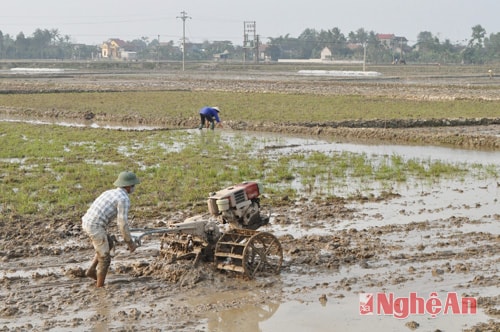Ensuring farmers' rights when participating in Agricultural Insurance
(Baonghean) - After 3 years of implementing Decision No. 315/2010/QD-TTg of the Prime Minister on piloting Agricultural Insurance in the period 2010-2013, Nghe An has achieved results. However, there are still some shortcomings that need to be resolved...
Dien Chau, Quynh Luu, Yen Thanh are 3 of the districts in the province selected to pilot rice crop insurance since 2011. In contrast to 2012, when this service was first implemented, the procedures and compensation payments for some damaged areas were very quick, so people were very excited. In 2013, the damage from the winter-spring crop to the summer-autumn crop has not yet been compensated. This issue has "heated up" the question and answer sessions at the People's Council meetings of Dien Chau and Quynh Luu districts. The untimely payment of compensation has affected the psychology and many households have withdrawn from participating. This situation can be seen most clearly in Dien Chau: In 2012, the spring crop had 6,851 participating households, the insurance premium was 2.196 billion VND, the summer-autumn crop had 17,556 participating households, the total insurance premium was up to 4.819 billion VND, but by the spring crop of 2013 the number of participating households decreased to 7,261 households, the insurance premium was 2.327 billion VND; the summer-autumn crop had 10,655 participating households, the insurance premium was 2.218 billion VND.
 |
| Farmers in Dien Nguyen commune (Dien Chau) prepare the land for the 2014 spring crop. |
To learn more, we went to Dien Binh and Dien Nguyen, the two communes with the highest rate of people participating in Agricultural Insurance in Dien Chau district. Ms. Nguyen Thi Tinh, an agricultural officer of Dien Nguyen commune, said: The locality had a crop failure due to the impact of storm No. 2 (July 2013), pests and diseases, and the BC15 variety, but just based on the reason that the BC15 variety is not guaranteed without compensation is not convincing.
Mr. Phan Ba Trung, Director of Bao Viet Nghe An, said: Some communes in Dien Chau and Quynh Luu that were not compensated were responded by Bao Viet in Document No. 208/BVNA dated November 14, 2013 and reported to the Provincial Agricultural Insurance Steering Committee, according to which although these areas were not significantly affected by natural disasters, the productivity loss was not enough to be compensated according to Insurance Rules 3035 and 2114 of the Ministry of Finance. Some units in the province are still waiting for statistical data to compare productivity, so the compensation procedures are slow.
According to Mr. Phan Ba Trung, agricultural insurance is the State's concern for farmers (the State supports 100% of the fee for poor households and 90% for near-poor households). The purpose of this new insurance is to ensure people's lives but it is also a new type of insurance service business, both implemented and adjusted; the payment must ensure principles and be based on regulations. Sharing the proposal of some localities to calculate compensation based on average productivity statistics for each field or each field managed by the cooperative instead of statistics for the whole commune as at present, Mr. Trung said that localities must build statistical data for each field.
In fact, the number of people participating in agricultural insurance is on the decline. The reason is that there has been a conflict of interest during the implementation process. The psychology of farmers participating in insurance when there is damage is to want to be compensated immediately, but insurance according to the rules must have a basis for compensation. In addition, people think that the compensation rules are also beneficial to insurance companies. For example, to be compensated for this summer-autumn crop, the average yield of the three most recent summer-autumn crops in the whole commune must be taken. However, because the average area of a commune includes many fields, some fields have good crops, some fields have bad crops, so when adding the average, it is very difficult to qualify for compensation. This is the reason why some communes in Dien Chau and Quynh Luu have fields that have been damaged by natural disasters or local pests and diseases and have lost dozens of hectares but have not been compensated, which is unreasonable and difficult to convince people.
On the other hand, because it is still in the pilot phase, the regulations on the list of insurance conditions are not comprehensive and complete. Although Decision 315/QD-TTg has stipulated that "other natural disaster risks" or "other epidemics" are also compensated, due to the lack of specific instructions, insurance agencies only compensate for 5 types of natural disaster risks and 7 types of epidemics as prescribed. When a new epidemic arises, people are not compensated (leaf blight in the 2012 spring rice crop in Dien Chau), but this disease is not yet listed in the list of insured diseases, so it is not compensated. When it is listed in the regulations, new natural disasters and epidemics arise, so people are always passive...
Therefore, in order for agricultural insurance to be implemented and attract people in the coming time, on the basis of pilot summary, on the one hand, agencies need to continue to perfect the rules in accordance with reality; on the other hand, they must strengthen propaganda so that people understand that sharing and participating in agricultural insurance is to prevent risks, so not all damages are compensated. Only then can agricultural insurance develop sustainably.
Nguyen Hai
